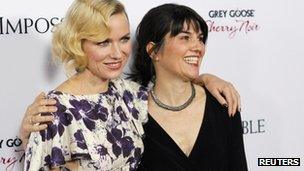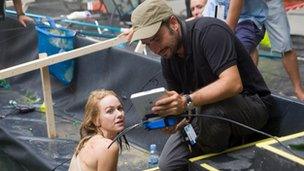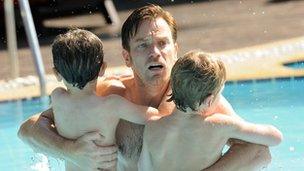Tsunami survivor's impossible story hits the big screen
- Published
Director Juan Antonio Bayona, says it was a "crazy idea" to recreate the tsunami with real water
Naomi Watts and Ewan McGregor star in The Impossible, a film based on the true story of one family who were caught in the deadly Indian Ocean tsunami.
On 26 December, 2004 a powerful earthquake off the Indonesian coast triggered a tsunami that devastated countries around the Indian Ocean, killing more than 230,000 people.
The Impossible is based on the true story of one of the survivors, Maria Belon, a Spanish tourist who was lounging by a pool in Thailand along with her husband and three young sons when the tsunami hit.
Belon has high praise for director Juan Antonio Bayona, who she says has made an accurate account of her harrowing story for the big screen - with only one discrepancy.
"The ball was yellow and in the film it is red," says Belon, referring to one of her son's Christmas gifts. "The rest is exactly the same."
Bayona recreated the tsunami with a mixture of digital effects and real water surges.

Maria Belon (r) was involved in all aspects of the filming process
"We created miniatures that were destroyed by a huge wave that we created in a water tank in Spain," he says.
The Spanish director admits it was "crazy" to commit to working with real water rather than a computer generated wave, but he wanted the story to be authentic.
This meant Naomi Watts and Tom Holland, who play mother and son Maria and Lucas, were gulping water in a massive water tank for five weeks.
"Being in the water tank was not something I particularly enjoyed," says Watts.

Director Juan Antonio Bayona says the cast threw themselves into the characters in a "brutal way".
"Tom loved it. He thought it was his own personal water park everyday, but he's 14 and he's got great athletic abilities, and I'm not close to either of those things," she adds.
The actress, who nearly drowned after being caught in a rip current as a teenager, admits she was scared and found it difficult to film scenes underwater.
But Watts has been rewarded for overcoming her fear of water with a Golden Globe nomination for best actress and she is being tipped as a possible Oscar contender for the role.
Maria Belon is also impressed with her on-screen character.
She describes Watts' performance as "extremely professional, extremely talented, extremely generous and beyond any expectation".
Belon helped Watts throughout the production and assisted with pivotal scenes in Thailand after the family returned to the country for a set visit.
"It was a bit painful sometimes during the whole process of working on the movie but it is pain that is worth going through because we truly believe in this film," says Belon.
Watts praised her off-screen counterpart for the courage it took to share her story.
"Some people who have gone through that kind of shock and disaster, it's hard for them, but she's incredibly articulate and it was really helpful to have that constant reminder of just how serious it was," says Watts.
Belon says her family agreed their stories could be told as long as the film-makers "took care of the soul of the story".
The director achieved this by involving the Belon family in the production and consulting real-life survivors and volunteers on "every important decision" in the film.
"We were shooting in Thailand in the same place where the story took place, surrounded by people who were there and that was incredibly helpful," says Bayona.
The director says the tsunami survivors he met provided him with "a filter of truth" which helped him choose "the right way" to tell the story.
He trusted his cast with "a lot of improvisation" and filmed key scenes unscripted.
"Ewan, Naomi and Tom threw themselves into the characters in a very brutal way," says Bayona.

Ewan McGregor says his sixteen years of parenting helped him in the role
Ewan McGregor, who plays Henry, says his 16 years of real-life parenting experience helped him with the role.
"It's not to say that if you didn't have children you wouldn't be able to still act [in the role of] a parent, of course you could, that's our job as actors. But it certainly…deepens it somehow," says McGregor.
"You know what that feels like to be in love with your children. It's a unique love. We don't have that kind of love for any other people in the world," he adds.
The real-life mother that inspired this Hollywood tear-jerker says she wanted to people to understand what it is like "to be alive".
"This personal story had another dimension, a universal dimension, and in that way it was important to tell the story," says Belon.
"I think before the tsunami I was blind. I was a blind person and now I see clearly."